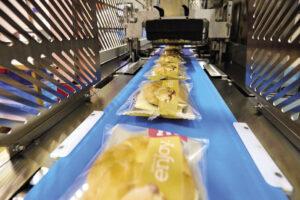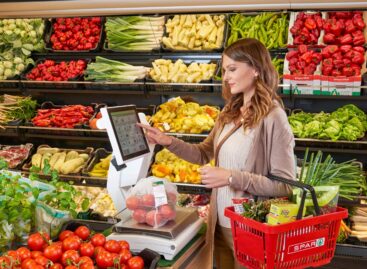Greenwashing wouldn’t be enough today
According to the Consumer Goods Sustainability Report 2024 by Accenture, 85% of FMCG companies have sped up their sustainability efforts in response to changing consumer demands and regulatory pressure.
This article is available for reading in Trade magazin 2024/8-9
Transparency is step zero
More than 73% of consumers are willing to change their consumption habits to reduce harmful environmental impacts, according to the Nielsen Global Consumer Trends Report 2023. Meanwhile it has also become clear: in most consumer goods categories, more than 80% of greenhouse gas emissions aren’t generated by in-house operations but in supply chains. Many questions arise about what exactly is happening in the supply chain, but in the developed world unfortunately only one fifth of FMCG companies have a transparent view of their supplier processes.

More than 73% of shoppers are willing to change their consumption habits in order to reduce environmental impacts, according to an international survey
Blockchain and AI
Sustainability was one of the main themes of the FMCG Connect 2024 event, which took place in India this April. Several presentations were focusing on the evolution of blockchain technology. Back in 2018 Walmart partnered with IBM to bring transparency to their supply chain through blockchain, while Coca-Cola has been monitoring and optimising resource use with the help of this technology since 2019. Nestlé also plays a pioneering role in this field: from raw material sourcing to production and distribution, every stage of the supply chain is recorded, giving all participants access to real-time, accurate data any by this minimising the risk of errors and discrepancies. AI-based developments can also make a major contribution – not only to improving supply chain transparency, but also to optimising resource use and waste reduction.
IoT: smart refrigerators and vending machines
In the FMCG industry the Internet of Things (IoT) offers a number of benefits that can significantly improve not only supply chain efficiency, but also product management and customer relationships. Coca-Cola is using smart vending machines and refrigerators with IoT connectivity to collect data on consumer preferences and stock levels, which is then used for inventory management and for marketing purposes. Unilever is also actively utilising IoT solutions in its supply chain, such as smart sensors for optimising production processes and reducing energy consumption.
Innovation for less packaging waste
According to a study by the U.S. Geological Survey (USGS), from the 6.3 billion tonnes of plastic generated since mass production began, 4.9 billion tonnes have unfortunately ended up in landfills or in nature. Studies claim that by 2050 there could be more plastic in our oceans than fish – it is obvious that the main problem is single-use plastic packaging. Consumers are demanding sustainable packaging solutions: the use of recycled or biodegradable materials, compostable options and minimalist packaging designs. In the beauty industry only 14% of packaging goes to a recycling plant and only 9% is actually recycled. PwC’s Global Consumer Insights Survey has revealed that 79% of consumers are more loyal to brands committed to environmental and social issues.

The Consumer Goods Forum, whose members include giants such as Walmart, Tesco and L’Oréal, has pledged to achieve zero net deforestation by 2025
No sustainability without complex ESG
A recent survey by EY (with responses from executives at more than 500 Fortune 1,000 companies) reveals that 82% of managers confirmed: their organisations have carbon reduction initiatives in place and set targets to achieve net zero emissions by a given year within 10 years. At the same time true sustainability can only be achieved if the full spectrum of environmental, social and governance (ESG) considerations is taken into account – this is a statement that 87% of CEOs agree with. While 78% say that curbing CO2 emissions, increasing resource efficiency and developing an ethical supply chain are the most important, three quarters of respondents believe that social responsibility is just as important a sustainability issue. 92% agree with the statement: without ESG, sustainability efforts would often remain superficial, ineffective measures. //
Energy efficiency and renewables in the food industry

Gábor Majoross
general manager
Enertech Hungária
Energy efficiency is essential for the food industry to achieve its sustainability goals. Well-planned and implemented energy improvements not only reduce environmental impacts, but also offer the potential for cost savings.
The design and selection of electrical monitoring systems for these production facilities is therefore a key issue, as they make sure that locally generated electricity is fully utilised or stored, at the same time minimising the amount of energy drawn from the grid.
As regards new investments, the safe positioning of infrastructure can be challenging, explains Gábor Majoross, general manager of Enertech Hungária Kft., a company that specialises in energy-efficiency development projects for the food industry. //
More efficient operations at SPAR’s food production plants
SPAR Magyarország has made significant investments in three of its food production plants, to increase operational efficiency and cut energy consumption. The company has invested more than HUF 181bn to develop the Regnum meat plants in Bicske and Perbál, plus the SPAR enjoy convenience product factory in Üllő. The Bicske plant has a new steam boiler for making meat products, the Perbál meat plant now utilises a carbon dioxide based transcritical cooling system, and the facility in Üllő uses LED lighting.

ESG: every third company is ready for certification
According to KPMG’s latest ESG Assurance Maturity Index, 29% of companies feel they are ready for independent ESG certification. KPMG’s index classifies the progress made by companies into three categories: leaders (29%), advanced (46%), and beginners (26%). The results show that readiness is improving, with the average score rising 6% for leaders and dropping 6% for beginners. 42% of firms in the leader category already have strict product-specific requirements for suppliers. //

Companies are placing more emphasis on suppliers and supply chains
Sustainability of the traditional meat industry must be supported
Dr Márton Nobilis, state secretary for food industry and trade policy was one of the speakers at the “Shaping Consumers” event in Brussels, talking about the challenges created by lab-grown meat and the need for uniform regulation at EU level.

He underlined that even if technological progress in lab-grown meat is significant, its social acceptance is still limited and consumer resistance is high. Supporting the sustainability of the traditional meat industry is essential to maintain the viability of rural communities. //
Related news
SPAR is preparing for an Easter rush: it is filling its stores with 570 tons of smoked meat products
🎧 Hallgasd a cikket: Lejátszás Szünet Folytatás Leállítás Nyelv: Auto…
Read more >Péter Sebestyén is Tesco’s new Chief Operating Officer
🎧 Hallgasd a cikket: Lejátszás Szünet Folytatás Leállítás Nyelv: Auto…
Read more >AI has left the chat window: in 2026 it will be booking, shopping and making decisions for us
🎧 Hallgasd a cikket: Lejátszás Szünet Folytatás Leállítás Nyelv: Auto…
Read more >Related news
MBH Analysis Center: The Hungarian economy may accelerate again in 2026, but the Iranian war carries serious risks
🎧 Hallgasd a cikket: Lejátszás Szünet Folytatás Leállítás Nyelv: Auto…
Read more >SPAR is preparing for an Easter rush: it is filling its stores with 570 tons of smoked meat products
🎧 Hallgasd a cikket: Lejátszás Szünet Folytatás Leállítás Nyelv: Auto…
Read more >Focus on the domestic fishing sector at SIRHA Budapest
🎧 Hallgasd a cikket: Lejátszás Szünet Folytatás Leállítás Nyelv: Auto…
Read more >








